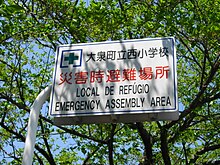Portuguese language in Asia
These speakers are distributed through regions which formerly served as colonies to Portugal, notably Macau and East Timor where the language is official albeit not widely spoken, or spoken by immigrants, notably the Brazilians in Japan, where quite possibly the greatest native Portuguese speaking community in Asia is located, as well as by some Afro-Asians and Luso-Asians.
The ethnologue prognostic, however, is much more grim and suggests Portuguese is almost entirely dying out in India, with only a student community of 1.500 L2 speakers [3].
Statistics regarding this topic are vastly variable, in such a way that the figure of total speakers in Asia can be much higher if one chooses to rely on the East Timorese census data (2015/2022), which points out that up to 30-60% of Timorese people have some capability in portuguese, either at reading, speaking or writing, depending on the source.
The comprehensive study done by Ethnologue however indicates that the proficiency in Portuguese demonstrated by the Timorese may be largely rudimentary and the 63.000 fluent speakers is more certain.
In Asia, Standard European Portuguese (português-padrão) forms the basis for the written and spoken norm, exclusively to East Timor and Macau.


